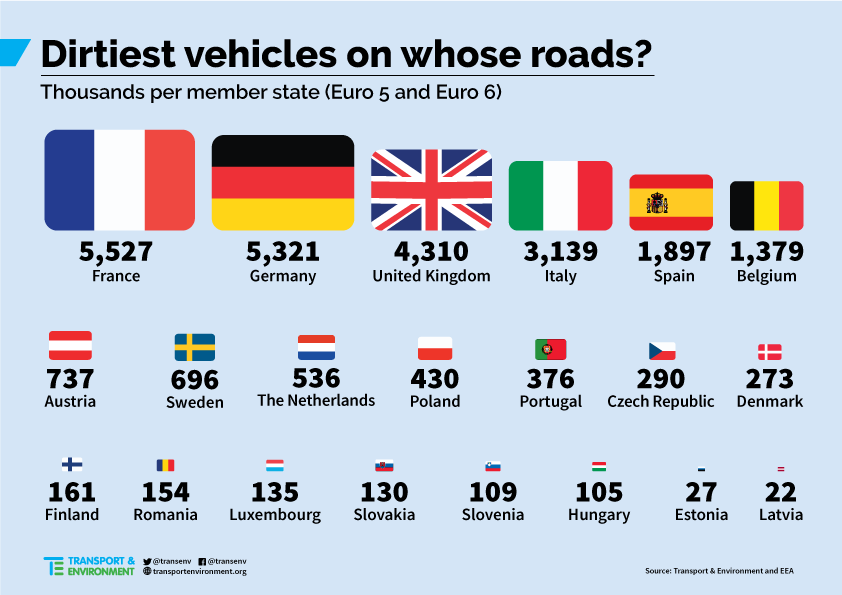
Interested in this kind of news?
Receive them directly in your inbox. Delivered once a week.
T&E analysed emissions test data from around 230 diesel car models. Data were taken from the investigations conducted by the British, French and German governments, as well as a large public database. The carmakers’ ranking was built with on-road performance figures mostly measured in real world driving. The key findings per car brand are: Fiat and Suzuki diesel cars on average pollute 15 times more than the legal NOx limit; Renault-Nissan vehicles exceed the limit more than 14 times; General Motors’ brands Opel/Vauxhall pollute 10 times more while Volkswagen diesel cars pollute twice as much as the Euro 6 standard.
Greg Archer, clean vehicles director at T&E, said: “One year after the US caught Volkswagen cheating, all carmakers keep selling grossly polluting diesel cars with the connivance of European governments. The automotive industry has captured its regulators, and European countries must now stand up for their citizens and stop this scandalous cover up. Only a recall of all harmful diesel cars will clean up our air and restore credibility in Europe’s legal system.”
29 million ‘dirty’ diesel cars and vans driving on Europe’s roads today
T&E’s calculations also show that today 29 million diesel cars and vans are driving on Europe’s roads that we classify as ‘dirty’, meaning that, for Euro 5 cars, they are at least 3 times over the relevant NOx limit. Only one in four diesel vehicles registered since 2011 achieve these modest thresholds. These vehicles were approved for sale by national type approval authorities, mainly in Germany, France, the UK, Spain, Italy, Luxembourg and the Netherlands. The largest number of ‘dirty’ diesels is found on French roads (5.5 million), followed by Germany (5,3 million), the UK (4,3 million), Italy (3,1 million), Spain (1,9 million) and Belgium (1,4 million).
“The true scandal of Dieselgate in Europe is national regulators turning a blind eye to the glaring evidence of test cheating with the sole purpose of protecting their national carmakers or their own business. This is killing tens of thousands of people annually. We need a European watchdog to stop EU member states protecting their national champions and to ensure the single market for vehicles operates in the interests of all citizens,” Greg Archer said.
Cheating on environmental regulation is not a victimless crime. This causes premature deaths. The World Health Organisation has described worsening air pollution levels as a “public health emergency”. Last year, the European Environment Agency said that NO2, mainly created by diesel engines in urban areas, is responsible for an estimated 72,000 premature deaths in Europe. The majority of NO2-related premature deaths occur in Italy (21,600); 14, 100 in the UK; Germany (10,400); 7,700 in France; Spain (5,900) and 2,300 in Belgium.


